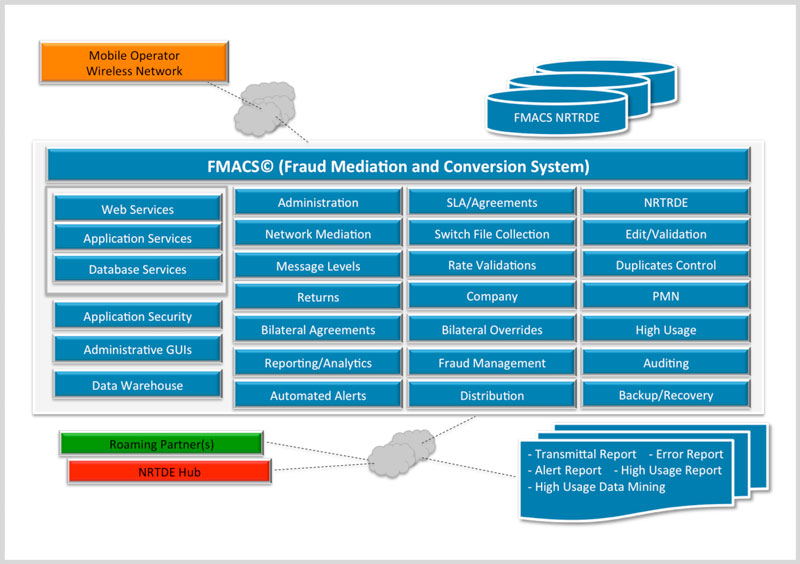FMACS© (Fraud Management Accounting and Control System)
FMACS is a powerful platform to enable mobile operators to facilitate GSM NRTRDE (Near Real-Time Roaming Data Exchange) services. At present, FMACS may be the most largely deployed commercial platform worldwide for NRTRDE network mediation, switch file collection and conversion services. FMACS seamlessly connects to the mobile operators network to provide network mediation, switch file collection, edit & validation and GSMA Transferred Account Data Interchange Group (TADIG) TD.35 compliance. All in near real-time, FMACS collects the network usage, facilitates the necessary conversion services, electronically distributes the output data to the appropriate destination, and provides intelligence to effectively manage the service.
Based upon GSMA NRTRDE standards, the VPMN (Visited Public Mobile Network) must forward call detail records (CDRs) in TD.35 conversion/compliance to the HPMN (Home Public Mobile Network) within four (4) hours of the call-end-time to enable near-real-time detection of fraudulent activities (committed by subscribers while roaming on other networks). If the VPMN is unable to meet this requirement then the VPMN is held liable for any associated roaming related fraud.
FMACS enables mobile operators to effectively combat fraud and is compliant with a majority of GSM wireless network in service worldwide. It supports interfaces among NRTRDE Hub vendors and enables the exchange between fraud management roamer partners and fraud systems. The modular architecture provides flexibility enabling operators to simply pick and choose the desired functions. TSS offers FMACS as both licensed based or managed services. Most of our customers elect our managed services solutions where we provide all of the necessary hardware, infrastructure, administration and operations. With TSS, your compliance is assured today and tomorrow.
BENCH MARKING, DISASTER RECOVERY AND CLUSTERING
Based on operator volumes, the system can be configured through the use of threads and servers. Each server can support up to 8 threads for processing. Each thread can be configured to process one large operator or many small operators. In addition, the system can be configured with multiple servers (clustering) and each of those servers support up to 8 threads.
Given this configuration (clustering and multiple threading), if any clustered server fails, the processing will switch to another server for completion. Ultimately, the cluster of servers also serves as the disaster recovery feature.
Estimated processing power per thread is 10,000 records per second. Multiplying that by 8 threads equals 80,000 records per second per server. The system performance per hour would be 288,000,000 records per server.

